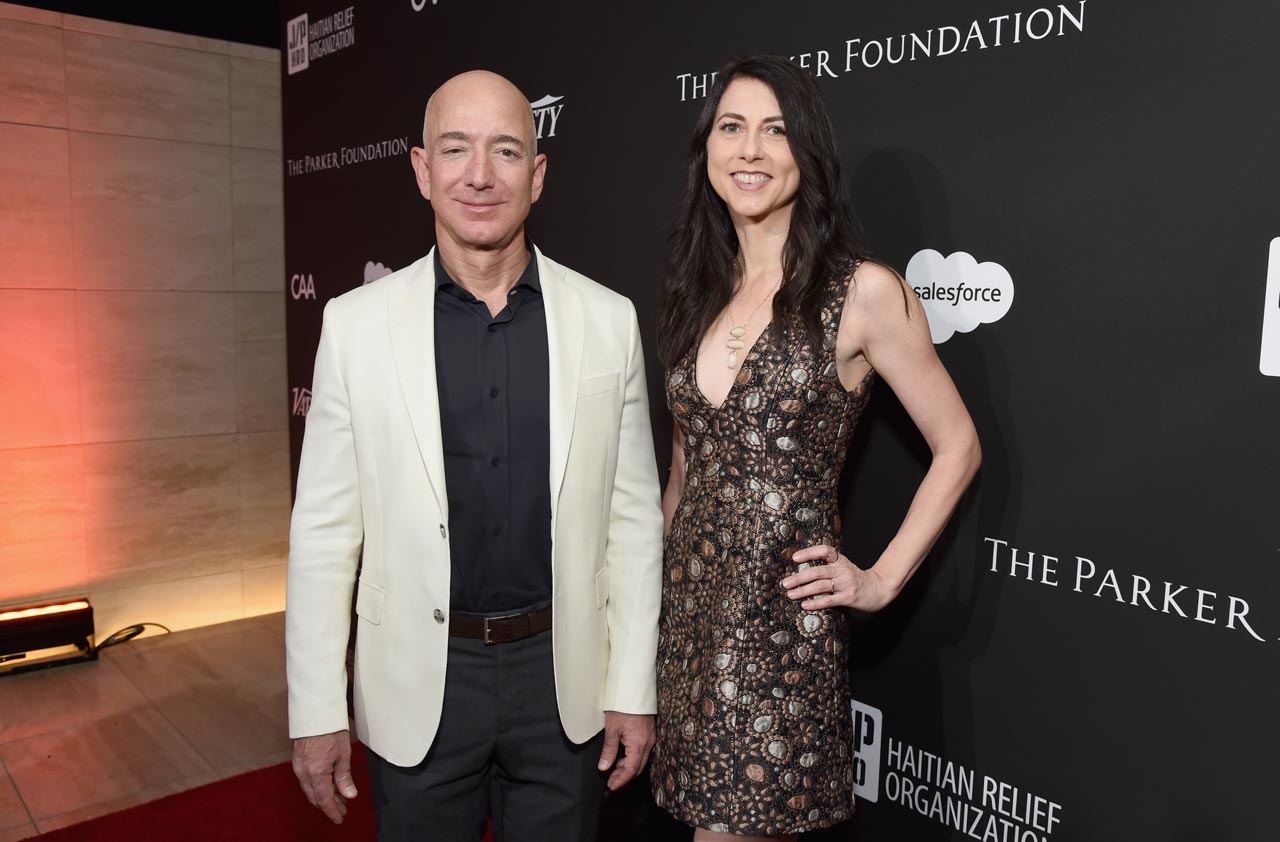McKenzie Bezos: 4 Wealth Strategy Concerns
$36 billion doesn't come without some challenges. There are four lingering money issues for McKenzie Bezos to take into consideration.


Profit and prosper with the best of Kiplinger's advice on investing, taxes, retirement, personal finance and much more. Delivered daily. Enter your email in the box and click Sign Me Up.
You are now subscribed
Your newsletter sign-up was successful
Want to add more newsletters?

Delivered daily
Kiplinger Today
Profit and prosper with the best of Kiplinger's advice on investing, taxes, retirement, personal finance and much more delivered daily. Smart money moves start here.

Sent five days a week
Kiplinger A Step Ahead
Get practical help to make better financial decisions in your everyday life, from spending to savings on top deals.

Delivered daily
Kiplinger Closing Bell
Get today's biggest financial and investing headlines delivered to your inbox every day the U.S. stock market is open.

Sent twice a week
Kiplinger Adviser Intel
Financial pros across the country share best practices and fresh tactics to preserve and grow your wealth.

Delivered weekly
Kiplinger Tax Tips
Trim your federal and state tax bills with practical tax-planning and tax-cutting strategies.

Sent twice a week
Kiplinger Retirement Tips
Your twice-a-week guide to planning and enjoying a financially secure and richly rewarding retirement

Sent bimonthly.
Kiplinger Adviser Angle
Insights for advisers, wealth managers and other financial professionals.

Sent twice a week
Kiplinger Investing Weekly
Your twice-a-week roundup of promising stocks, funds, companies and industries you should consider, ones you should avoid, and why.

Sent weekly for six weeks
Kiplinger Invest for Retirement
Your step-by-step six-part series on how to invest for retirement, from devising a successful strategy to exactly which investments to choose.
On April 4, it was announced that McKenzie Bezos would be receiving $36 billion worth of assets from her divorce from Jeff Bezos, founder of Amazon and the world’s wealthiest person.
First of all, congratulations to Jeff and McKenzie for keeping this divorce process short, out of the media as much as possible, and out of the courts. We are not going to know the details of the Bezos’ agreement. However, some information has been disclosed in the press.
As reported by CNN, McKenzie is keeping 4% of their Amazon stock, worth approximately $36 billion. Jeff retains voting power for her shares, as well as ownership of The Washington Post and Blue Origin, their space exploration venture. According to The Economist, this makes the Bezos divorce the most expensive in history by a long shot.
From just $107.88 $24.99 for Kiplinger Personal Finance
Become a smarter, better informed investor. Subscribe from just $107.88 $24.99, plus get up to 4 Special Issues

Sign up for Kiplinger’s Free Newsletters
Profit and prosper with the best of expert advice on investing, taxes, retirement, personal finance and more - straight to your e-mail.
Profit and prosper with the best of expert advice - straight to your e-mail.
As a post-divorce financial planner, I feel a little silly thinking of what I would tell McKenzie to do with her money now. The magnitude of her portfolio is well beyond run-of-the-mill, high-net-worth divorces with assets “only” in the millions or tens of millions of dollars. McKenzie can buy $100-million or $200-million houses and condos wherever she wants. She can have her own jets and her own yachts. She could buy an island or two.
McKenzie’s wealth, though, is concentrated in Amazon (AMZN) stock. That has worked out well for the Bezos’ for the past several years. It is likely to continue to be a great source of wealth for both of them in the future. As it stands, McKenzie is now the third-richest woman in the world. Who knows, if she holds onto AMZN stock, she could become the richest woman in the world one day! McKenzie’s concerns with budgeting, taxes, and wealth strategy will soon be in a class of their own.
There are, however, some lingering considerations for McKenzie, particularly when it comes to capital gains taxes, portfolio management, philanthropy, and wealth transfer.
Capital Gains Taxes
McKenzie probably has an enormous tax liability built into her AMZN holdings. While I am not privy to her cost basis, it is not unreasonable to assume that it is close to zero since the Bezos’ have owned Amazon stock since the company’s inception. Should McKenzie sell her AMZN stock, the entire amount would likely be subject to capital gains taxes. Because McKenzie is likely to be in the top tax bracket, she would pay 23.8% in federal capital-gains tax (the top 20% bracket plus the 3.8% ACA surcharge), plus state liability that would depend on where she lives at the time. As such, McKenzie may not be worth quite $36 billion after taxes are accounted for.
A benefit of keeping the stock until her death is that her estate will benefit from a step up in cost basis. This would mean that the IRS would consider the cost of the stock to be equal to its value at her death. This favorable tax treatment would wipe out her heirs’ capital gains tax liability.
Portfolio Management
Nevertheless, the standard advice that wealth strategists give clients with ordinary wealth applies to Ms. Bezos as well: It would be in McKenzie’s financial interest to diversify her holdings. Diversifying would help her reduce the risk of having her wealth concentrated into a single stock. It is a problem that McKenzie (and Jeff) share with many employees of technology and biotech startups.
McKenzie might not want to sell all of her AMZN stock or even most of it. Although we have not read their separation agreement, she has probably agreed with Jeff that she will retain the bulk of her holding. She may also believe enough in AMZN and Jeff’s leadership to sincerely want to keep it. Regardless, McKenzie should still diversify her portfolio to protect herself against AMZN-specific risks.
Philanthropy
An advantage of having more money than you need is that you have the option to use the excess to make a measurable impact on the world through philanthropy. In 2018, Jeff and McKenzie created a $2 billion fund, the Bezos Day One Fund, to help fight homelessness. Given that the home page of the fund now only features Jeff’s signature, this may mean that Jeff is keeping this also. McKenzie will likely organize her own charity. What will her cause be?
Philanthropy can be an effective tax and estate management tool, primarily because the IRS allows taxpayers who itemize to deduct your donations against your income. For McKenzie, it is about deciding what to do with the money, instead of letting Congress decide.
Wealth Transfer
McKenzie’s net worth is far in excess of the current protections from federal and state estate taxes. Unless she previously planned for it during her marriage, she will have to revise her estate plan. Even though her heirs would benefit from a step up in basis on her AMZN stock if she chooses not to diversify, the inheritance would still be subject to estate taxes, potentially in the billions of dollars.
Of course, no matter how much estate tax is due, it is likely that she will have plenty to leave to her heirs.
Financially, McKenzie Bezos has what wealth strategists would consider “good financial problems.” She has the financial freedom to focus on the important aspects of life: family, relationships and making a difference.
Profit and prosper with the best of Kiplinger's advice on investing, taxes, retirement, personal finance and much more. Delivered daily. Enter your email in the box and click Sign Me Up.

Chris Chen CFP® CDFA is the founder of Insight Financial Strategists LLC, a fee-only investment advisory firm in Newton, Mass. He specializes in retirement planning and divorce financial planning for professionals and business owners. Chris is a member of the National Association of Personal Financial Advisors (NAPFA). He is on the Board of Directors of the Massachusetts Council on Family Mediation.
-
 How Much It Costs to Host a Super Bowl Party in 2026
How Much It Costs to Host a Super Bowl Party in 2026Hosting a Super Bowl party in 2026 could cost you. Here's a breakdown of food, drink and entertainment costs — plus ways to save.
-
 3 Reasons to Use a 5-Year CD As You Approach Retirement
3 Reasons to Use a 5-Year CD As You Approach RetirementA five-year CD can help you reach other milestones as you approach retirement.
-
 Your Adult Kids Are Doing Fine. Is It Time To Spend Some of Their Inheritance?
Your Adult Kids Are Doing Fine. Is It Time To Spend Some of Their Inheritance?If your kids are successful, do they need an inheritance? Ask yourself these four questions before passing down another dollar.
-
 How to Get the Fair Value for Your Shares When You Are in the Minority Vote on a Sale of Substantially All Corporate Assets
How to Get the Fair Value for Your Shares When You Are in the Minority Vote on a Sale of Substantially All Corporate AssetsWhen a sale of substantially all corporate assets is approved by majority vote, shareholders on the losing side of the vote should understand their rights.
-
 I Met With 100-Plus Advisers to Develop This Road Map for Adopting AI
I Met With 100-Plus Advisers to Develop This Road Map for Adopting AIFor financial advisers eager to embrace AI but unsure where to start, this road map will help you integrate the right tools and safeguards into your work.
-
 The Referral Revolution: How to Grow Your Business With Trust
The Referral Revolution: How to Grow Your Business With TrustYou can attract ideal clients by focusing on value and leveraging your current relationships to create a referral-based practice.
-
 This Is How You Can Land a Job You'll Love
This Is How You Can Land a Job You'll Love"Work How You Are Wired" leads job seekers on a journey of self-discovery that could help them snag the job of their dreams.
-
 The Key to a Successful Transition When Selling Your Business: Start the Process Sooner Than You Think You Need To
The Key to a Successful Transition When Selling Your Business: Start the Process Sooner Than You Think You Need ToWay before selling your business, you can align tax strategy, estate planning, family priorities and investment decisions to create flexibility.
-
 Have You Aligned Your Tax Strategy With These 5 OBBBA Changes?
Have You Aligned Your Tax Strategy With These 5 OBBBA Changes?Individuals and businesses should work closely with their financial advisers to refine tax strategies this season in light of these five OBBBA changes.
-
 A Financial Plan Is a Living Document: Is Yours Still Breathing?
A Financial Plan Is a Living Document: Is Yours Still Breathing?If you've made a financial plan, congratulations, but have you reviewed it recently? Here are six reasons why your plan needs regular TLC.
-
 Your Guide to Financial Stability as a Military Spouse, Courtesy of a Financial Planner
Your Guide to Financial Stability as a Military Spouse, Courtesy of a Financial PlannerThese practical resources and benefits can help military spouses with managing a budget, tax and retirement planning, as well as supporting their own career